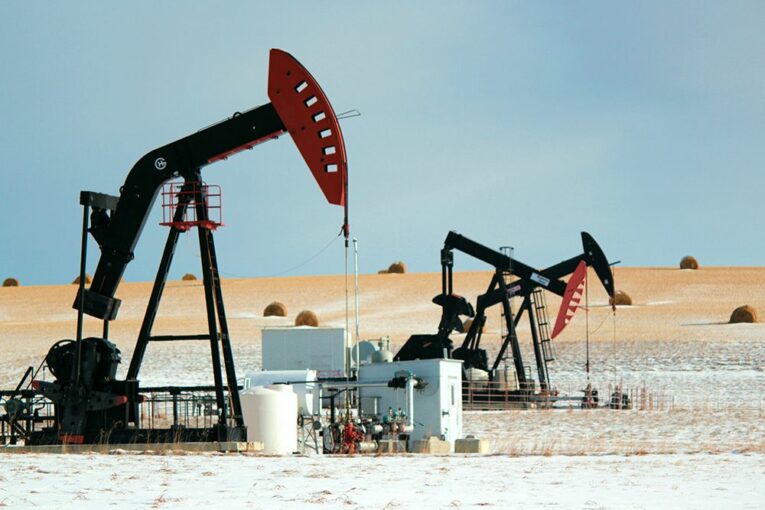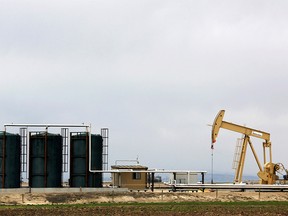
How do you strike a deal to make a major purchase — or a significant sale — when the underlying price of the asset careens around like a bumper car at a county fair?
This is the conundrum facing potential buyers and sellers in the Canadian oilpatch, as the value of mergers and acquisitions (M&A) dipped by 14 per cent last year while oil and natural gas prices went on a wild roller-coaster ride.
However, the first major deal of the year was announced late last week, with junior producer Saturn Oil & Gas Inc. snapping up a larger private company, Ridgeback Resources Inc., for $525 million in a cash-and-share transaction.
“Quite frankly, it’s actually not an easy time to transact. It is challenging for a lot of companies. Financing is challenging,” Ridgeback CEO Paul Charron said in an interview.
“It’s funny how, when commodity prices are strong, that M&A is just as challenging, if not more (so), because the sellers . . . are looking to get the full value and the buyers are looking to buy it at less — just because of the uncertainty of the commodity prices.”
Calgary-based Saturn agreed to pay $475 million in cash and issue $50 million of shares to acquire Ridgeback, which produces about 17,000 barrels of oil equivalent (boe) per day in Saskatchewan and Alberta.
Saturn, which pumped out about 11,000 boe per day during the third quarter of last year, is traded on the TSX Venture Exchange. The company said the transaction will be financed by increasing the company’s existing senior secured term loan by $375 million, and with a bought deal that’s expected to generate proceeds of about $125 million.
“This transformational acquisition is an important step for Saturn to establish material scale in its Alberta and Saskatchewan operations,” Saturn CEO John Jeffrey said in a statement.
Charron said Ridgeback started a formal process to examine its strategic alternatives in July and had five parcels of assets available for sale. One package was sold last month to another private firm.
For Ridgeback, Charron said Saturn’s offer provides an opportunity for the company’s private shareholders — sponsored primarily by private equity investors Apollo Global Management and Blackstone Credit — a chance to exit.
“They were looking for liquidity,” he said. “At some point, they want their money back.”
Recommended from Editorial
-

Varcoe: List of billion-dollar oilpatch ‘survivors’ grows as outlook stays strong
-

Varcoe: Even with crude prices pulling back, M&A action picks up in Canada’s oilpatch with $2.3B deal
The acquisition of Ridgeback comes after a drop in M&A action last year in both Canada and the U.S.
The total value of deal-making in the upstream Canadian oil and gas industry reached about $15.6 billion last year, with roughly two-thirds flowing from corporate transactions, according to data from Sayer Energy Advisors.
The figure is down from $18.1 billion in 2021, and well off the highest point of the last decade, when M&A activity topped $54 billion in 2012.
“There weren’t any of those megadeals, and that is what drives those huge values,” said Sayer president Tom Pavic.
“One of the reasons why (it dropped) was the volatility in commodity prices . . . When you have the volatility, it’s hard for buyers and sellers to come together.”
The largest transaction last year saw Strathcona Resources acquire Serafina Energy for $2.3 billion, Whitecap Resources buy XTO Energy Canada for $1.9 billion, and Tamarack Valley Energy purchase Deltastream Energy for $1.52 billion.
Oil and natural gas prices have gyrated wildly since the pandemic began, with benchmark U.S. crude prices crashing briefly into negative territory in 2020, but skyrocketing to US$120 a barrel after Russia’s invasion of Ukraine last February.
Prices for benchmark West Texas Intermediate (WTI) crude closed Tuesday at $80.13 a barrel, down $1.49.
Sayer data also show total capital raised by the sector last year, including debt and equity, decreased to $2.7 billion, down from $10.8 billion reported in 2021.
If commodity prices hold near current levels, Pavic expects the level of Canadian oilpatch acquisitions and mergers in 2023 will likely be similar to last year.

South of the border, M&A deals in the upstream oil and gas sector tumbled 13 per cent to US$58 billion last year, with the overall U.S. deal count falling to its lowest point since 2005, according to a report released Tuesday by Enverus Intelligence Research.
In Canada, speculation has swirled recently around Westbrick Energy being on the block, as the privately held company — with KKR & Co. Inc. owning a 77 per cent stake — produces about 60,000 boe per day.
Westbrick CEO Ken McCagherty said Tuesday there have been some inquiries in the company, but “I haven’t received an offer that I’m prepared to sell at.”
As for M&A in Canada’s energy sector this year, he called it a “game of patience.”
“If somebody is willing to buy the quality that we’ve been able to put together, great. If they aren’t, we’re quite happy . . . We’re not in a rush to do anything that doesn’t make any sense,” he added.
Analyst Patrick O’Rourke of ATB Capital Markets said unpredictable energy prices have made it more difficult for buyers and sellers to reach agreements over the past year.
However, he expects to see strong levels of deal-making in 2023, fuelled in part by companies looking to replenish their prospects for future drilling and production.
He also noted that a lack of pipeline capacity out of Western Canada — a chronic concern for producers for much of the past decade — is beginning to fade.
Construction on the Trans Mountain pipeline expansion is expected to be completed later this year, and is continuing on the Coastal GasLink pipeline in British Columbia.
“Every day, we’re getting closer and closer to both,” O’Rourke said.
“There are probably companies that look at it and say, ‘OK, structurally, the picture is going to be a lot better here. Now is the time to acquire things.’ ”
Chris Varcoe is a Calgary Herald columnist.
You can read more of the news on source
